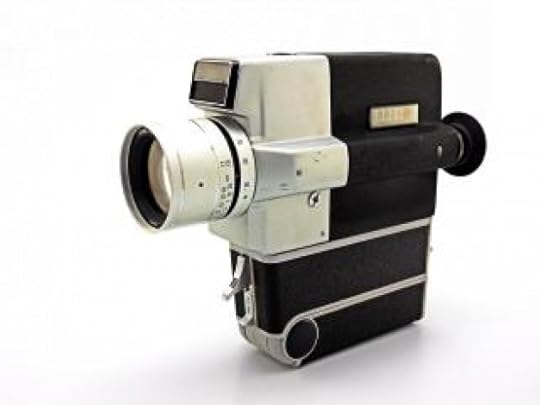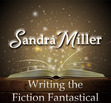Sandra Miller's Blog, page 4
May 17, 2011
Free Reading -or- The Value of the Non-Seller
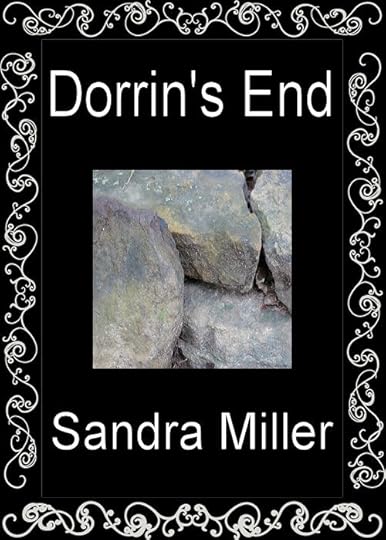
Earlier this week I posted a brand new short story on Smashwords. It also has a page on my website. It's gotten quite a few hits.
It's also generated some questions. Why, some wonder, would you post a story for free when you could charge for it?
Two reasons. First, Dorrin's End is a short-short story. It's between 1000 and 1100 words–in some markets, that's just barely over the flash fiction limit. It's still a good story, an interesting story, but not the kind of thing I would feel comfortable asking someone to pay for.
Second, it's a way of getting my name out there in front of people who may never otherwise come across it. Dorrin's End is a fantasy short. My hope is that someone who reads it, and likes it, might later check out The Crystal Cave. It's like built in sampling, by author instead of by title.
Besides, I like the story and I would like to think people might get some enjoyment out of it. Dorrin's End and Crystal Cave are birds of a feather, in some ways. Both of them were shopped around to fantasy magazines. Both of them received personal notes from editors with lots of praise–and both of them, due to financial reasons, were passed.
I think that kind of experience has value, even if the work ultimately does not sell to a magazine. It helps you to build confidence in your own instincts; it helps you to become better at judging whether your own work is good. And that is a skill that I think we are all going to need more of in this changing business.








May 15, 2011
What Hollywood Taught Me About Writing -or- Think Like a Mechanic
Today's topic is one I have been kicking around for awhile, but seem to have trouble putting into words.
There are two sides to writing (at least, arguably there are many more.) There is the immersive, magical experience that we wish to create for our readers, and sometimes experience ourselves even while we write. And then there is the mechanical side–the words and their rhythm and whether that works, the scenes and the way they are built to create a plot and whether that works…you can spend a lot of time diving into the mechanics of what makes a good story good, and where a not-so-good story missed the mark.
Usually these two sides work together. But as writers, I think we have a tendency to put more emphasis on the magical side, and sometimes this works to our disadvantage. A writer who wishes to regularly produce consistently good work must have a solid understanding of story mechanics. There just isn't any other way. As in any other field, raw talent will only carry you so far.
How many times have you overheard people discussing a movie, and heard someone say, "The book was better?" How many times have you said it yourself? To me, this has to do with the magical side of writing. You are expressing a preference for the experience that was present in the book–and perhaps expressing disappointment in the movie.
But this disappointment is also an opportunity for learning, for deepening your understanding of story mechanics. Remember that we are dealing with two different media, and that ways of conveying information that work beautifully on the page may not adapt well to the screen. But at the end of the day, both media would like to tell the same story.
So, in the interest of time, or best utilization of the medium, or any of a hundred other concerns, the decision is made to cut particular scenes from the narrative as it existed in the book. (This is usually what disappoints us–I know with Lord of the Rings and Harry Potter, these were my primary disappointments, even though the movies were great.) Sometimes this will not affect the primary storyline.
But sometimes, scenes that are cut contain information that is necessary to the storyline. Remember when the Order of the Phoenix movie did not show our characters cleaning the Black house, and so never showed the discovery of the golden locket? I remember wondering how they would handle that later on, when it became necessary to the plot.
This is where the opportunity for you as a writer is. With that information gone, the story is broken. How can you fix it?
You have to think like a story mechanic. You have to look at the information that needs to be conveyed, and look at the overall storyline, and work out the best spot to put it in there, without breaking anything else.
A lot of writers are loathe to look at a story that way. They would much rather stay on the magical side. I think we all start out like that. Unfortunately the only way to identify and fix a lot of story problems requires the ability to think like a story mechanic. To step up and really consistently produce quality work, we have to get comfortable with that view, and the sooner the better.








May 11, 2011
Your Mind, Unleashed

"Where do you get your ideas?"
It's a common question, and different writers have different ways of answering it. Some resort to philosophical or metaphysical discussions, other take up the defensive behind humorous quips. The truth is, it's a very difficult question, and there isn't any one-size-fits-all answer. There are as many answers to that question as there are writers.
I have shared my own methods for rationally generating ideas (Ideas: A Practical Exercise and Sparks) but I have to admit that a lot of the best ideas don't come during the rational question & answer process I use most of the time. They are like Eureka! moments and they come unbidden and often at inconvenient times.
What do you do when you're waiting to fall asleep at night? Or washing the dishes? Or driving somewhere familiar with the radio off? For me times like this are when I "take the reins off" my own mind and let it wander. I start thinking about my latest project without any specific question or problem in mind. And quite often some idea that may at first glance seem crazy will come out of the process.
Some of them are still crazy at second glance. But the majority of the time there is something I can use there–something that makes the story better, something that often takes it in directions unexpected even to me. This is part of what makes writing so exciting and unpredictable. You can never really tell where the lightning will strike, or what it will leave behind when it does.
We live in a very structured world, with our time divided neatly into days and hours, and somebody always more than happy to tell us what we should be focusing on at any given moment. We are very accustomed to directing our minds and our thoughts where we think they should go. I'm here today simply to remind you there is value in letting your mind off of the leash from time to time. You may be surprised what it brings back to you.








March 29, 2011
Writing and Portkeys
 Do you read or watch Harry Potter? Because I'm about to make what may well be an annoying analogy:
Do you read or watch Harry Potter? Because I'm about to make what may well be an annoying analogy:
A good story is like a portkey.
At this point you must figure you know what I'm going to say next. I'll say something like, a good story is like a portkey because they both transport you to new places, or something hokey like that, right?
Right?
Well, actually, no. That is certainly a fine argument, but it's not the argument I am going to make today. Today, leaving all abstract concepts of stories as transportation behind, I would like to focus more specifically on how Rowling described the way using a portkey felt. Remember that? It first showed up in Book 4, and it was pretty vivid if my memory serves. She described the feeling of something hooking Harry right behind the navel and dragging him along in a breathless rush that he couldn't stop or control. Of course, those aren't her exact words. But the gist was the same.
That exact sensation is what you get from a well-plotted, well-paced, well-told story. Remember the last time you started reading a book and stayed up all night, even though you had to get up early in the morning, because you just couldn't put it down? You just had to find out what happened next. No matter what.
Do you agree? To me, this is one of the ultimate goals of writing, and also one of the ultimate tests. Does your story reach out and drag the reader to the end in a breathless rush they can't stop or control?
If not, how can you change it so that it does?








March 24, 2011
Oh, the dreaded Back Cover Text!
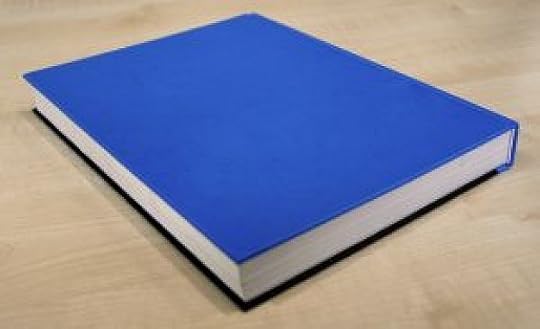 One of the benefits of indie publishing (yes, there are benefits!) is having total control over the entire process, and the appearance of your finished product.
One of the benefits of indie publishing (yes, there are benefits!) is having total control over the entire process, and the appearance of your finished product.
Of course, this leads us to one of the drawbacks as well. Major publishing houses have copywriters who do back cover copy, and do it very well. Most authors are not well-prepared to write their own copy, and many are too close to the work to do it well. As an indie-published author, back cover copy is also something you have total control over.
Can I just say it? That can sort of stink. I've pulled my hair out a time or two over back cover text, and never been really happy with any of it. In fact I became so completely unhappy with Concerto's back cover copy that I recently decided to rewrite it.
Of course, the book is out there. I'm done with it, and unless I decide it's worth pulling it off the market for a few days to update the cover (which I suppose I may do one of these days), the original back cover text will remain.
But in attempting to rewrite it, I had to take a step back and think about what back cover copy really does, and how it should be written. We're writers. There's no reason we can't write decent back cover copy, along with stories and books and everything else we write. We just need to know what the rules are, because it's very different from writing a novel.
I'd like to share with you what I learned. You can use my results to decide whether my method is worth bothering with for yourself.
So to start, my original back cover text, with my apologies:
What if…
…you could work with the greatest violinist
in history?
…the greatest violinist in history was also
the chief suspect in his wife's murder?
…a violent stalker terrorized you just outside
the reach of the law?
What if…
…the only person who could stop the stalker
…solve the murder
…and save your life…
…was you?
Join Chrispen Marnett on the journey of a lifetime as she unravels the layers of the past…
…love…
…lies…
…music…
…murder…
…to discover the truth about the Newton Philharmonic Symphony Orchestra and its international celebrity concertmaster, Alexis Brooks.
Okay, so there are some problems here. Even I could see that, though I wasn't immediately clear how to fix it. It seems to be composed simply to take up a lot of space on the page, but its problems go deeper than that. I think one of the reviews on Goodreads says it best:
…the synopsis on the back cover did not promise much…
Is she right, or is she right?
So I took a step back. When you look at a book, probably the first thing you look at is the cover. I like my cover, so we're good there. What's the next thing you do? If you're like most people, you flip it over and check out the back cover text. What are you looking for there?
This is an important question, though it seems obvious. Missing this question is why my back cover copy was such a mess. I had no grasp at all on why a person reads back cover text in the first place.
Back cover text needs to convey five basic things to be successful.
Who
Why
Where
What
How
I love these questions. If you read my recent posts on Ideas, then you've seen my fascination with them. They work here too.
Who–you must introduce your main character, and at least reference your villain. You may also reference other supporting characters, like love interest or sidekick, depending on how strong a part they play in the story. My main character is mentioned only in the last paragraph. I suppose we assume the violent stalker is the enemy. And there is a famous violinist in there somewhere…nothing is very clear about any of these characters, though.
Why–this is your primary conflict that drives your story. Why is this story happening? I suppose I would assume the primary conflict in the copy above is our protagonist vs the violent stalker. Hard to be sure, though, since it's somewhat hard to tell who the protagonist actually is.
Where–your setting. Give a nod to where all this is happening, it makes a difference to your reader. How much emphasis you want to give this really depends on the book you've got. Setting can play a pretty major role in some genres. If Concerto had been a fantasy or sci-fi novel, the setting would have required more explanation. But in this blurb above–I feel like the setting is absent entirely.
What–it's hard to explain, but this should reference your genre. It's the "what" happens to make it a romance, or a western, or a whatever. This is where you put some spin on the ball, to angle it to your target readers. I don't know that there is anything in the cover text above that would angle this very strongly to suspense readers, or any other kind of reader, really.
How–this is your hook. It's how you are going to hold your reader's attention–if you can't hold them to the end of your blurb, you will never keep them all the way through your book. Cite the danger, risk, or threat that raises the stakes and keeps the pressure on.
Keeping these things in mind, I took another stab at writing back cover copy for Concerto. I know I'm biased, but I think this is a more effective blurb:
"I see you."
Three simple words from her telephone in the dead of night send violinist Chrispen Marnett's life spiraling in directions she never imagined. The chance to work with the greatest violinist alive drew her to Newton, but nothing could have prepared her for what she found there. Terror lurks in unexpected places–a ringing phone, a late-night rehearsal, unexpected flowers.
And what could have prepared her for Alexis Brooks: symphony concertmaster, international superstar, and accused murderer? Withdrawn and moody, Alexis is cut off from everyone around him; his colleagues in the symphony, his fans, even his own father. Everyone from her mother to the Newton Police has warned Chrispen against Alexis, but as her own danger increases, he may be her only ally.
Join Chrispen on the journey of a lifetime as she fights for her sanity, her happiness, and her life. To survive, she must unravel the layers of the past and learn the secrets the Newton Philharmonic Symphony Orchestra hides.








March 22, 2011
Sparks
 Last time we talked about ideas, and how we might work a spark into an idea, into a story.
Last time we talked about ideas, and how we might work a spark into an idea, into a story.
Today, let's talk some more about sparks.
The spark, if you recall, is what we called that tiny seed, too small to even call an idea. But with some care we can sprout it into an idea that we can work into a story. In our last discussion, the spark was a single image. Asking questions about that image helped to develop our story idea.
But what we didn't discuss was where that spark came from. You've got to have something to start with, no matter how small.
Sparks can come from anywhere. In the last post I wanted an example, something intriguing, that would be good to further the discussion. So I thought about it for a few minutes and that's what I came up with. Sometimes that will happen.
But if it doesn't, it's important to remember that the world around you is rife with sparks. You may find sparks in things other people assign no importance to. The crucial thing is to be prepared to catch them. To push our analogy, any spark will fizzle and die if it isn't caught and nurtured into a flame.
How do you catch them? Here you have lots of options. I always have a small memo-size notebook in my purse, and it's handy to grab and jot notes in while I'm out. You can also keep one on your nightstand in case you find something in a dream that feels like story fodder.
Most cellular phones these days have features that can be used for this. You can use an application to write yourself a quick note, or send yourself an email with your thoughts.
Some people prefer to speak their thoughts. I've known people who carried microcassette recorders, or their newer flash-memory-based equivalents, to catch these types of ideas. You could even call your home phone and leave yourself a message!
The important thing is to make yourself a note of what caught your attention, and come back to it later when you're ready to ask questions. A particular bit of overheard dialog, a peculiar piece of action seen from afar–any number of ordinary things can spark an idea. All you have to do is make sure you are prepared to catch them when they fly.








March 21, 2011
Ideas–A Practical Exercise
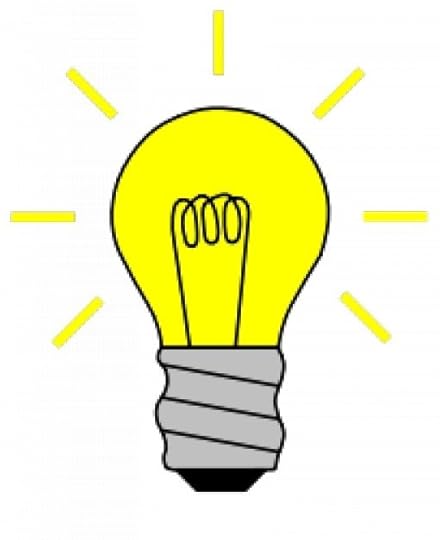 Lawrence Block once commented in one of his articles on writing, and I'm paraphrasing here, that the question, "Where do you get your ideas?" is misleading; it implies the writer is struck by an idea for a story, and from there everything is golden.
Lawrence Block once commented in one of his articles on writing, and I'm paraphrasing here, that the question, "Where do you get your ideas?" is misleading; it implies the writer is struck by an idea for a story, and from there everything is golden.
He's right–the process of writing is an endless generation of ideas, one after the other. Character development, plotting, backstory–all of them are nothing but the writer asking themselves questions and then dreaming up the answers, one after another, until the story is finished.
So, here you are, and you want to write a story. But you're sitting there with a blank page and nothing particular coming to mind to put on it. Now what?
If you're like most writers, you have a glimmer of an idea. Maybe not a full-fledged story–not yet–but maybe a character, or a compelling conflict, or a bit of engaging business you want to use, or just a general thought of "I'd like to tell a story about this."
First, we need to abandon the notion that the blank page–or empty Word document–in front of us at this moment is our story. We're going to do some work on this idea first. This is the part of the writing process that to me is most like magic–starting with nothing and stringing stuff out of your head onto the page until you have a solid story.
Next, we need to abandon the notion that there are any "wrong" or "bad" answers. As you work up ideas, you'll be making up answers to your own questions. Some answers you'll like better than others. Some answers will make you want to keep looking for a different answer  That is fine. This is your story, the only one who decides what the right answers are is you. The right answer is the one that leads to a story that you want to tell.
That is fine. This is your story, the only one who decides what the right answers are is you. The right answer is the one that leads to a story that you want to tell.
Let's say I have in mind a particular image. It's not a whole story, but it's compelling and I would like to turn it into a story. I am imagining a woman, standing in front of her dresser, pointing a revolver at her reflection in the mirror.
This is my spark; the thing that's making me want to write. Your spark could be anything. The process is always the same. At the top of this blank sheet of paper, I am going to write out my spark.
Spark: a woman, standing in front of her dresser, pointing a revolver at her reflection in the mirror.
There are lots of questions I could ask here to start fleshing this idea out. The old saws we learned in journalism class serve well: Who? What? Where? When? How?
But the King of all questions is Why? If you only get to ask one question, make it Why. Why? is the question that will get you to the heart of things faster than any other. I could ask Who and do a detailed character sketch of the woman with the revolver. I could ask Where and go into great detail about the bedroom she's in, or What and discuss the revolver.
But the first question I'm going to ask is Why?
Question: why is she pointing a gun at her own reflection?
This is where I start just making things up. You've got to turn off your internal critic, the one who'll happily inform you that all of your ideas stink. Frankly, you aren't looking for your internal critic's opinion here.
You are looking for your own. You are going to start making up answers, throwing them out there. How will you know you have a good one? You'll feel it. You'll get shivers, or goosebumps, or you'll just stare at your writing on the page and say "Wow."
Answers: People usually point guns at things because they are afraid of them. Or they want to eat them.
Is she afraid of her own reflection? Maybe. Maybe she is insane, and we're demonstrating it here, with a gun in the dressing room mirror.
Or maybe her reflection really is dangerous.
That–that right there. That is when I felt like I was onto something–something interesting, something scary–something I would want to write. I'm on the right track there.
Given the same question, the answer that you react to may be different. That's fine–your story should be yours.
So I've got my first answer that I really like. All of that other stuff above it is just harmless chatter. When I'm done here, I can copy out the useful bits onto a clean sheet of paper so that all I have left is the good stuff.
What do I do now?
Of course! I ask:
Question: Why is her reflection dangerous?
And I start making up answers until one clicks with me. And then I look at that answer, and see what questions it prompts. And at some point farther on down the page, I'm going to feel like I have enough material to start writing, so I will. When I reach a point in the narrative where I feel like I need to know more to continue, I will come back to this paper and ask some more questions.
It's perfectly possible to carry this idea out to something a story could be written from. I may do that, if it would be helpful. But if you're struggling with ideas and are interested in the process, it would probably be even more helpful to give it a go yourself.
I'd love to see what you come up with. I'm sure it will be awesome.








Heroes & Heroines
 I've been thinking about something recently. I've been thinking about some of the action in Redeemer of the Realm, my current work in progress.
I've been thinking about something recently. I've been thinking about some of the action in Redeemer of the Realm, my current work in progress.
Redeemer is a fantasy work. Early on, there is a scene where a sword-wielding assassin breaks into our hero's room. Our hero, who is just becoming proficient with a blade, manages to defend well enough to stay alive, but sustains a pretty nasty wound in the process.
Later on, our hero gets mouthy with somebody bigger and meaner and mentally unstable, and gets pretty soundly beaten. Very soundly beaten.
These scenes sound pretty standard, pretty much like anything you might read in any other fantasy novel. So why are they being singled out?
Because in Redeemer of the Realm, our hero is female. Now consider, this is fantasy–by definition the people in the story are bound by different societal and cultural conventions than our own.
But the readers–the readers are still bound pretty firmly by our societal and cultural conventions. And in our conventions, violence toward women is A Very Bad Thing.
I agree with that, by the way. I'm not arguing against that.
What I'm doing is raising an interesting dilemma brought up by a couple of views we hold in our society. They don't seem to directly contradict each other, but these couple of scenes in Redeemer–and some of the action in Concerto, especially, because it's set here and now–show that there is at least one way in which holding both beliefs simultaneously can cause some reader discomfort.
Women should be treated as equals to men
Violence against women is bad
In the context of a story, these views do contradict. When you read a story, you expect the hero to have a goal. You expect him to meet strong opposition. You expect him to fight hard, and not always win. Things are never easy for the hero, and if for a short time they seem easy, it's only because they are about to take a turn for the hellish.
Heroes fight hard. Heroes get knocked down, and get back up again. As many times as it takes.
But…when your hero is a female, what then? I've seen in some writers a tendency to take it easier on their heroines than their heroes–the writers I've noticed doing that tend to be men, although that may be because I read a lot of male writers. (For the record, I am female, which may be why I am giving the question thought. I'm not sure of my own bias here.)
I thought about all of this when I first started The Music Mage (the book before Redeemer) and when I first started Concerto. I don't think it's fair to make things easier on my heroines just because they are female.
My heroines fight hard. My heroines get knocked down, and get back up again. As many times as it takes. They aren't super-human, and they are often at a disadvantage against men who are bigger and stronger than they are, and many of their fights are not physical. But they work hard for their goals, just as hard as the heroes.
I don't claim to offer any answers here–just raising an interesting question. What about you? How do you treat heroes vs heroines in your writing? How do you prefer them treated in your reading?








March 20, 2011
Migraines & Computers
 Anybody else out there suffer migraines? Anybody?
Anybody else out there suffer migraines? Anybody?
Of course, I know I'm not the only one with migraines. I tell you though, a bad one can certainly make you feel like you are all alone.
This weekend has been a migraine weekend for me. Yesterday was the worst, so I used my favorite treatment–a really hot shower followed by an ice pack–and retreated to bed. Not much going on yesterday, no blog, no writing.
This morning was still pretty bad. But by this afternoon it had subsided to a dull roar, and I was ready to try some writing, at least to get some notes down about where my next scene was headed.
The problem? Looking at a computer screen turned the dull roar into screaming, blistering, eyeball-roasting pain. Since I've been doing all of my writing lately on my IdeaPad, this was not so cool.
I decided to go back to longhand, and make my notes the old-fashioned way. The only problem with this idea is that I have carpal tunnel syndrome, and arthritis in my fingers. So gripping a pen is not really cool–I can do it for short tasks, like writing a check, but for something longer, like real writing? Not happening.
Fortunately I have grappled with this particular problem before. So I could just reach into my nightstand drawer for my two favorite remedies for this problem:
Evo Pen
I have to admit, it was a close call between this and the PenAgain. Sometimes I switch between them depending on my moodI do seem to reach for this one more often, though, and have recently ordered three more so that I can keep them everywhere. Next on my list is the chrome-plated version, I'll let you know how that one works out.
All of the ergonomic pens that I prefer completely change your approach to holding a pen. This one you can cup in the palm of your hand, with your index finger over the long top side of the pen. It is lightweight and writes smoothly, and so far the ink cartridges seem to last longer than I had expected.
For writing pages at a time, I have not found a pen to beat this one. My school-age kids are constantly trying to steal it from me, so it isn't just old folks like me who appreciate it.

and
PenAgain
This is my close-second favorite pen. I have this original 3 pack, the ErgoSof, and the ErgoSleek. The ErgoSof is very much similar to the original, I don't notice enough difference between them to be worth comment. The ErgoSleek has the look and the feel of a very nice pen–nice heavy feel to it, nice operation. It does take different refills than the other two varieties.
These three packs are good for stashing all over the house wherever you might need to reach for a pen. You slip your index finger into the curve at the top of the pen. When I bought these pens I was having a particularly hard time with joint pain in my thumb, and this pen took care of that until I found the Evo-Pen.
The clip on the pen is not really useful as a clip–it's too small and fragile to actually clip it to anything. I just added a pencil pouch to my manuscript binder and carry the pens in there. When my kids can't steal my Evo-Pen, they will steal these.
I have lots of different ergonomic pens, but these are the two I keep coming back to. You can check out the others I have reviewed on my website.








March 18, 2011
Writing and Music
 From September 2010:
From September 2010:
I remember, years ago, reading a quote from Louis L'Amour, my favorite writer all through high school.
"I could sit in the middle of Sunset Boulevard and write with my typewriter on my knees. Temperamental I am not."
At the time, in high school, I agreed wholeheartedly. Surroundings–comfort, noise, distractions–what did they matter? I could focus entirely on my typewriter, my pen, or later, my computer, and it really didn't matter what went on around me. Back then, I wrote with all kinds of music playing; it just didn't bother me.
Enter marriage, kids, the internet, and aging–in my late twenties I found if I wanted to write, surroundings suddenly mattered. TV and music, both had to be off for me to be productive. My brain became too easily distracted, and if I tried to write one thing while hearing another, what actually tended to come out was a mangled-up mish-mash of the two.
So now, my regular routine is writing in silence, with a fan to cover up the noise of the rest of the house. Until the other night, when I had to write a difficult scene, and I was having a hard time of it. It was a scene where something bad happens to my main character, at the hands of someone who is supposed to be a friend. It had to be compelling, I had to get in that scene. And I didn't want to.
And that's when I discovered the value of writing with music, again, as though I had never realized it before. My iPod, which was shuffling through a classical playlist, hit a movie soundtrack (why are they in my classical playlist? Don't ask
) I don't even remember specifically which soundtrack it was, it may have been Lord of the Rings, or it may have been Spiderman (LOVE Danny Elfman's work), but either way it was a dark dramatic track where scary things were clearly happening onscreen.
And I found I could write my scene. I was pushed to write my scene, and the tempo of the escalating music pushed me to write even faster, with more urgency. My scene fed off the music.
So–moral of the story, I've rediscovered a tool I had discarded years ago. I can decide the mood of the scene I'm working on, put on some non-distracting music that matches, and everything goes easier.
Non-distracting is the key. I tend to work with classical music for just that reason; but there are certain pieces I know to keep off the playlist, even so. The Mendelssohn Violin Concerto, for instance–I can't hear it without getting instantly sucked in and forgetting whatever I was working on.
So why am I bringing this post from the old blog now? Because I just had a reminder last night, again, how important this little trick can be. Another tricky couple of scenes–another couple of appropriate movie soundtrack and classical concerto titles picked–another couple of difficult scenes down 
It sounds simple, and it is, but it's really useful, too.









